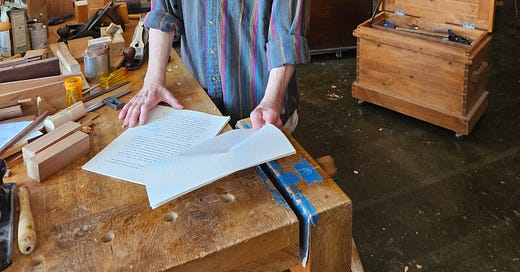Many years ago I was married to a wonderful, brilliant woman, to whom I owe more than I can ever repay. She had a doctorate in English literature and read the drafts of all my stories. You might be surprised to hear that her reactions gave me encouragement but almost no practical help at all. That was because she seemed to be in awe of the very impulse to create original stories. She gave praise but no actionable ideas for improvement. Looking back, I can’t truly fault her. I badly needed the praise.
But if you are writing, you need critical readers. Don’t wait for validation from the literary journal editors. Life is far too short for that. You need readers to make you a better writer. Let your readers be your first editors.
“Everybody needs a good editor,” said Wilma Ebbitt, my professor and mentor back at Penn State. Editor of guides and handbooks for writers back in the day, she knew what she was talking about. For our purposes here, what I mean is that we who want to write need a friend who will read our work and give honest, critical responses.
It should generally be assumed that, if you want to write, you will take the time to learn the basic rules of the sentence and the paragraph and that you will do multiple drafts of your work, cleaning up problems and making improvements along the way. At some point, however, you need to show your work. Your reader need not be an “English major.” It might be, but it need not be.
That critical eye isn’t just for the commas, the apostrophes, or the spelling. It has to be for character and dialogue and scene, etc. Nowadays my first reader is an irascible woodworker buddy. He can be cantankerous and does not mince words. If my prose goes purple, I get a gleeful Bronx cheer instead of a hello on the phone. If a plot turn makes no sense to him, I get, “For God’s sake! Don’t make me puke!” or a string of hilarious abuse. I often want to reach through the phone and strangle him. We argue and I insist that I’m fine with it the way it is, but then I almost always find myself seeing his point and making the change the next day. I value this grumpy geezer more than I can tell you. He is a dear friend and, better yet, he has a built-in bullshit detector.
So. My advice is to find someone who 1) likes to read fiction or whatever it is that you write, 2) is intelligent, and 3) is willing to dig into your work and be straight with you. I hope you find somebody good, maybe even someone who doesn’t send your blood pressure through the ceiling, but if that’s who you find, just take a deep breath before each consultation.



